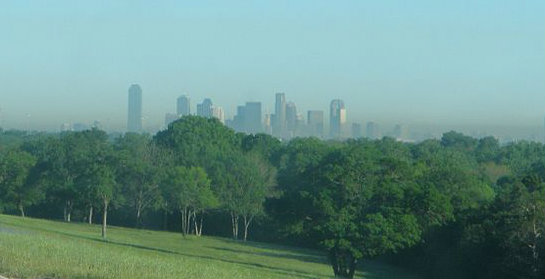Texas Fights Air-Quality Standards Because Lower Ozone Levels Can Kill People
Here's the good news: Dallas-Fort Worth ozone levels for the first this year dropped below the federal standard of 84 parts per billion. The bad news: the 84-ppb standard the area has just now met for the first time is from 1997. The current standard is 75 ppb, well below DFW's 81 ppb mark. Worse still, most scientists consider the newer standard too high and say people exposed to that much ozone are at increased risk of asthma, heart disease and lung disease. For years, scientists and public health advocates have been pushing for a limit closer to 60 ppb.
Wikimedia Commons/Turn 685 TCEQ: Sure it looks bad, but it's not like you're going to leave your air conditioning.
Predictably, Texas disagrees, and not just on the grounds that tougher restrictions will eat into economic growth. As the Texas Tribune>reports, one of the state's top environmental regulators argues that lower ozone levels could actually kill people.
"I haven't seen the data that says lowering ozone will produce a health benefit," Michael Honeycutt, the agency's chief toxicologist told the Tribune. "In fact, I've seen data that shows it might have a negative health benefit."
See also: American Lung Association: Dallas' Air Is Really Dirty, and It's Gotten a Bit Worse
Honeycutt is correct in a very limited, very technical sense. Data included in an EPA review of the health impact of lower ozone standards predicts that deaths attributable to ozone would actually increase in two cities, Houston and New York, were current levels reduced. (The increases are temporary, according to scientists who spoke with the Trib, the result of there not being as much nitrogen oxide around to break down the ozone). He's also right that the science is complicated, making it hard to draw a straight line from a certain level of ozone reduction and a quantifiable public health benefit.
But compare his position with that of the American Lung Association, which is pushing for a 60 ppb because study after study has found that "breathing ozone can cause adverse health effects at concentrations lower than the 75 ppb 8-hour average standard" and that "adverse lung function effects and symptoms are observed in some individuals at 60 ppb." Or consider the verdict of the EPA's Clean Air Scientific Advisory Committee, an independent panel of scientists that reviews air-quality policy. It wrote over the summer that "there is adequate scientific evidence to recommend a range of levels for a revised primary ozone standard from 70 ppb to 60 ppb," though the higher end of that range "provides little margin of safety for the protection of public health, particularly for sensitive subpopulations."
Honeycutt, who has been TCEQ's chief toxicologist since 2003, has been pushing back against the evidence for years. Here he is quoted in a 2010 New York Times article railing against lower ozone standards because they might require Texans to drive less and change their daily habits, which would be "unacceptable to the public." Here he is a year later, testifying on the subject before Congress.
More recently, he opined on the topic for a TCEQ newsletter. It's an instructive document in which he doubles down on his claim that "further lowering of the ozone standard will fail to provide any measurable increase in human health protection" before delving into some other pet theories.
Honeycutt argues, for example, that the scientific claim that ozone increases asthma risk is bunk because hospital admissions for asthma in Dallas and Denton counties peak in winter, when ozone levels are lowest. Studies showing negative health impacts of ozone are bunk because most people spend the vast majority of their time during the summer inside, where air conditioning units have removed most ozone from the air. EPA also fails to consider that putting a tighter cap on ozone will require power companies to quit belching so much of it into the air, which will result in higher electricity costs.
"There is a real, human cost resulting from higher energy bills, especially in Texas," he writes. "For poor Texans (and many poor Texans are elderly Texans), being able to keep their home cool on hot and humid summer days has a real health benefit."
All in all, an admirably thorough bit of obfuscation that would be curious coming from a scientist if that scientist weren't an employee of the TCEQ, an agency that Governor Rick Perry's 14-year hold over state government has turned into less a regulatory agency than an EPA-bashing propaganda machine. Indeed, Honeycutt has made this part of his mission.
"I'm often asked, wouldn't it be easier to just accept what the EPA does? Isn't it a lot of trouble to try to affect the direction of the EPA's 16,000 employees and $8 billion budget?" he writes in the newsletter. "Yes, of course that would be easier, but it wouldn't be the right thing to do."
Send your story tips to the author, Eric Nicholson.








































